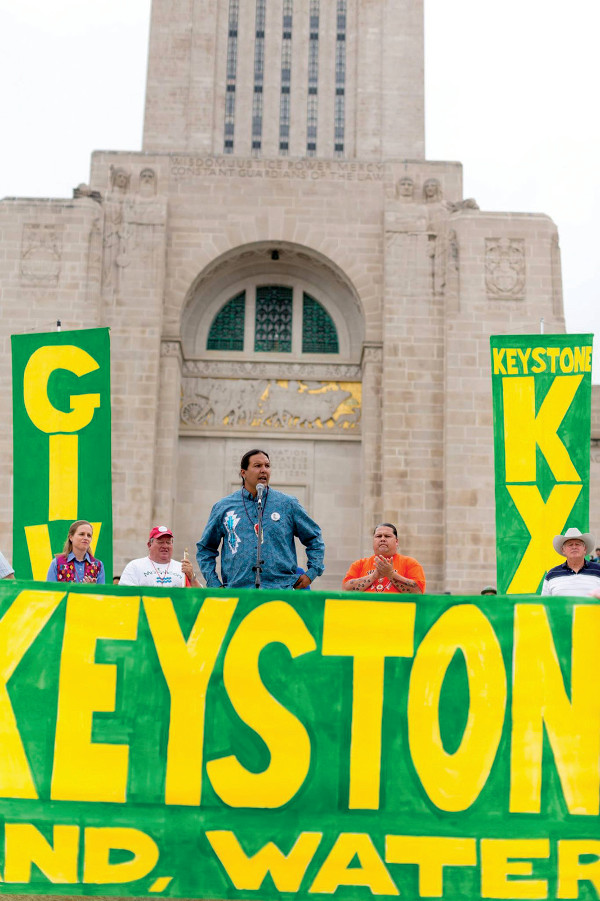
PHOTO/ALEX MATZKE, BOLD NEBRASKA
Editor’s Note: Art Tanderup, a farmer fighting construction of TransCanada’s Keystone XL pipeline in Nebraska, talks with Sandy Reid of the People’s Tribune about the Nebraska Public Service Commission (PSC) ruling that allows the pipeline to proceed, but on an alternative route. Tanderup discusses the pipeline’s danger to the Ogallala Aquifer, the largest fresh water aquifer in existence, and to farmlands and Native lands. As we go to print, TransCanada Corporation has asked the PSC to reconsider and in response, landowners filed a motion for oral arguments and their own motion to reconsider.
“It’s an outrage for our government to allow a foreign corporation the right to come in and take farmers and ranchers and Natives land to make more money. That is wrong,” said Art Tanderup.
“We hoped for an all out rejection of the pipeline. However, TransCanada didn’t get their preferred route. So that’s a victory. And, the alternative route creates all kinds of issues for the company.” According to reports, it adds an additional pumping station and five miles to the company’s preferred route, making it more expensive. “There’s also all kinds of potential legal challenges. The landowners in between where the company’s preferred route changed to the alternative route don’t even know whether they are on that pipeline route.”
“But it’s not a win for water,” Tanderup said. “Approximately 40% of the company’s alternative route still includes the Eastern sand hills where we live and where the aquifer is the highest in some places. On this portion of the route they will be burying the pipe in the top layer of the aquifer.” The alternate route is near TransCanada’s existing Keystone XL 1 Pipeline, which just leaked 210,000+ gallons in South Dakota. “Had we had that spill, those chemicals would be in this aquifer. They can bring in men and equipment, but there is absolutely no way to clean it up. Once those chemicals are in that water they disperse and it only takes a drop of Benzene to kill somebody, to kill the livestock, pollute crops and pastures. In many places, that aquifer has springs that come out into our rivers. A spill could have a devastating effect on the entire state. That aquifer, in my opinion, is the greatest resource that flows from this state. But we couldn’t talk about safety issues at the PSC hearing because TransCanada influenced people that made the law.”
“The Ponca Tribe of Nebraska and all the tribes in Nebraska have vowed to fight. They don’t want this thing in any way, shape or form. It crosses sacred land, the Ponca Trail of Tears (which is on my farm,) and it crosses that Trail at least twice with alternate routes. On the same day this decision was heard, the tribes were up in South Dakota signing a treaty opposing any tar sands pipeline. We stand hand in hand with our Native relatives.”
“We’re going to do everything we can to go through the court system. If that doesn’t work, [my wife] Helen and I have decided that we’re going to be there when the bulldozers come. They’ll have to come through us, or bury us right there. This is all wrong, absolutely totally wrong. There’s nothing good if we are left with a world with nothing good. If you don’t stand up for something you believe in, your life is worthless. We can’t be apathetic anymore.”
Stand up for what you believe in says Nebraska pipeline fighter
Latest
The People’s Tribune opens its pages to voices of the movement for change. Our articles are written by individuals or organizations, along with our own reporting. Bylined articles reflect the views of the authors. Articles entitled “From the Editors” reflect the views of the editorial board. Please credit the source when sharing: peoplestribune.org. Please donate to help us keep bringing you voices of the movement for change. Click here. We’re all volunteer, no paid staff. The People’s Tribune is a 501C4 organization.

